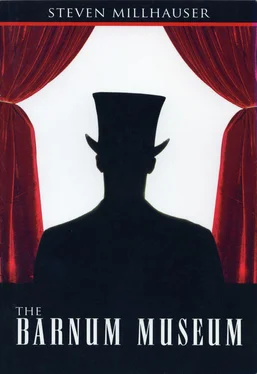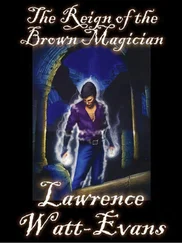He could barely see. Blurred rows of aquamarine lights stretched curving into the distance, tinting the mist. Mr. Porter felt as if he were driving at the bottom of a green swimming pool. He stayed to the right, straining through rippling lenses for the broken white line that marked the lane. A passing truck sprayed water against the windshield and for a moment Mr. Porter could see nothing but the lazy wipers, bowing left and right, left and right, like twin actors on a stage. The applause has died down, the audience is making its way to the exits, but still they bow, left and right, left and right, though the audience has left long ago and the lights are out in the deserted theater. A white streak appeared; Mr. Porter was driving in the center of two lanes. Behind him a truck was flashing its lights. Mr. Porter swerved to the right. The truck rushed past, throwing water at the side window like a fistful of sand. In the distance he saw a red glow from the shopping center. The melting exit signs announced his town.
Mr. Porter turned off at his exit and drove slowly down to an orange streetlight that spilled over its glass container into the surrounding air and dripped onto the flowing windshield. The rain was falling harder. It hammered against the car top like sharp fingernails drumming against a metal table. Who will come? No one comes, no one will ever come, though the fingernails drum drum drum against the metal table. All at once Mr. Porter remembered that he was wet, and the memory was like stepping into the rain; the drumming rain seemed to be pouring through the roof and driving his clothes against his skin. Soon he would be home. He would lie warm and dry in his bed like a freshly ironed shirt in a drawer. Looking carefully both ways, Mr. Porter turned left and passed under the dripping highway. In the near distance appeared the familiar railroad trestle. Above it the black sky glowed murky red from the shopping center across Main Street. As Mr. Porter passed under the trestle the car sank into water above its wheels, and stopped.
He waited, stepped on the gas, and waited longer; stepped on the gas, waited, stepped on the gas; waited; stepped on the gas. As he waited he noticed water seeping through the doors onto the floor. Quickly he tried again. The water was rising slowly. Mr. Porter opened the door and stepped out.
He stood up to his knees in water. And for a moment he felt like lying down in the water and closing his eyes, he imagined his body at peace, drifting away in the dark water. Mr. Porter began to pull his legs forward in the direction of the shopping center. He was more than two miles from home. A sudden downpour fell on him — he had forgotten the momentary shelter of the trestle. Through the heavy drops he passed slowly up the incline to the stoplight at Main Street. Across the street the long smear of the shopping center loomed above a deserted parking lot. The vast orange-red letters of the supermarket and the cherry-red letters of the bargain store stained the dark mist overhead and flowed in the gleaming tar. In a far corner of the parking lot stood a glass telephone booth that reminded him of an aquarium and a coffin. The light changed, and as Mr. Porter walked across the street he heard sucking and oozing sounds in his ruined shoes.
As he stepped onto the parking lot he saw his shoe disappear into a red puddle; when he lifted it he saw the polish dripping away in red-black drops. The rain was coming in sharp slanting lines, driving against his cheeks, his shirt, his shoes. Mr. Porter glanced at his watch. Through the dripping crystal he saw two wavy hands. A faint black smudge was visible on his pale wrist beside the shining black band. Mr. Porter rubbed the band with a fingertip; his finger showed a black stain. Through streaming eyeglasses he peered up at the distant telephone booth. He imagined the telephone ringing in his empty house. The parking lot was streaked with luminous bands of cherry-red and orange-red, and Mr. Porter saw red ripples in his shoes, a reddish glow in his flashing hands. His cat would prick up her ears before slowly settling her chin on her outstretched paws. Mr. Porter tried to walk quickly but he seemed to be walking through a tide. He would never arrive anywhere. His shoes were ruined, his shirt was ruined, everything was washing away. The rain was flooding him, passing through him and coming out the other side. Everything was coming undone. Black drops fell from his watchband onto his hands, blue drops fell from his shirtsleeves onto his arms. Have I wasted my life? The telephone booth was far, far away.
Mr. Porter stopped. He was standing alone under a dripping red-black sky. Behind him the railway trestle had melted away, nothing remained of the highway but a distant shimmer. His shirt was running down in blue streams onto his pants, his pants were trickling onto his shoes, his shoes were flowing away in inky streams. Everything was washing away. His cheeks were running, his eyeglasses were spilling down in bright crystal drops, flesh-colored streams fell from his shining fingertips, he was dissolving in the rain. In ripples of blue and flesh and tan and black he flowed into the shine of the tar. For a moment on an empty parking lot a bright puddle gleamed, but then the rain washed it away.
Alice, falling, sees on the top shelf of the open cupboard a jar bearing the label RASPBERRY JAM, a yew-wood tea caddy with brass fastenings and a design of handpainted plants and flowers on the lid, and a tin of lemon snaps: the dark green top shows in the center an oval containing a colored head of Prince Albert. On the bottom shelf Alice sees a porcelain dessert plate with a gilt border and a center panel showing a young man in a tilted tricorne, red jacket, and white breeches, standing beside an oak tree; a bread knife with an ivory handle carved to show a boy holding wheat in his arms; and a silver-plated cream jug with a garland of silver-plated leaves and berries encircling the base. So slowly is Alice falling that she has time to take in all the details, to note the pink thistles on the lid of the tea caddy and the yellow buttons on the red jacket of the man on the dessert plate, to observe the faint reflections of her face above and below the label on the jar of raspberry jam.
Alice does not know how long she has been falling, but when she looks up she has the sense of a great shaft of darkness stretching interminably upward. In the alien tunnel-world she tries to think of the bright upper world, where her sister sits on a bank, under a tree, reading a book without pictures or conversations, but as she falls deeper and deeper it becomes harder for her thoughts to reach so high, as if each thought is a heavy rope that has to be hurled upward in the act of falling. And gradually, as she falls, a change comes about: the mysterious shaft or vertical tunnel through which she is falling begins to seem familiar to her, with its cupboards, its shelves, its lamplit bumps and hollows, while the upper world grows shadowy and strange; and as she falls she has to remind herself that somewhere far above, suddenly the air is blinding blue, white-and-yellow daisies grow in a green field, on a sloping bank her sister sits reading in sun-checked shade.
The dark walls of the shaft are faintly illuminated by globed oil lamps attached at irregular intervals to wrought-iron wall brackets: each bracket has the shape of an elongated S-curve turned sideways, and on the apex of the outermost curve sits a brass mermaid holding up a cylindrical chased-brass base with a brass adjustment knob; on the cylinder rests the globe of glass, topped by a slender glass stem. The light from the lamps permits Alice to observe the objects that abound on the walls. In addition to the cupboards with their shelves, she passes maps and pictures hung on pegs, including a black-and-white engraving of Scotland showing all the counties outlined in red, and a painting of a lion leaping onto the back of a horse: the horse’s head is twisted backward, its teeth are bared, the flared nostrils are wide as teacups, and dark red streaks of blood course along the shiny brown sides; a pair of oak bookshelves holding Twenty-five Village Sermons, Bewick’s Birds , Macauley’s History, The Fair Maid of Perth, The Life and Works of Edwin Landseer , Pope’s Homer, Coke upon Lyttleton , Rogers’ Pleasures of Memory, Sir Charles Grandison, Robberies and Murders of the Most Notorious Pirates , Bayle’s Dictionary, Ivo and Verena, Pilgrim’s Progress , and Gems of European Art ; a barometer in a case of walnut wood shaped like an anchor: the flukes of the anchor support the glass disc, in which is pictured Neptune riding a sea horse within a circle of words (RAIN, FAIR, CHANGE, STORMY); a niche containing a marble Venus and Cupid: the winged, curly-haired boy reaches for his bow, which his seated mother holds away: her robe has slipped to her lap, and one breast is visible above his reaching arm; and a Gothic-arch-topped set of small, glass-fronted shelves on which stand a barefoot porcelain girl holding a basket of flowers over one forearm, a pincushion set in a brass wheelbarrow and stuck with hat pins ornamented with china flowers, a playing-card box with a floral border and a center panel showing a castellated mansion in Tunbridge Wells, two small oval silhouettes framed in ivory and showing, respectively, a snub-nosed girl in a bonnet and a snub-nosed boy in a flat-brimmed hat, a red glass rose with green glass thorns, and a majolica snake devouring a toad.
Читать дальше












